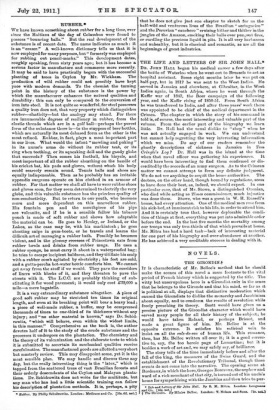THE LIFE AND LETTERS OF SIR JOHN HALL.* Da. JOHN
HALL began his medical career a few days after the battle of Waterloo when he went out to Brussels to act as hospital assistant. Some eight months later he was put on half-pay, but in 1817 he was sent to the West Indies. He served in Jamaica and elsewhere, at Gibraltar, in the West Indies again, in South Africa, where he went through the Kaffir war of /847, the Boer campaign of the following year, and the Kaffir rising of 1850-51. From South Africa he was transferred to India, and after three years' work there was appointed to be chief of the medical department in the Crimea. The chapter in which the story of his command is told is, of course, the most interesting and valuable part of the volume. From the earlier part of the biography we learn little. Dr. Hall had the usual dislike to "shop" when he was not actually engaged in work. We can understand but cannot help regretting the very interesting information which we miss. Do any of our readers remember the ghastly descriptions of sickness in Jamaica in Ton Cringle's Log ? Dr. Hall was hi the island at the time when that naval officer was gathering his experiences. It would have been interesting to find them confirmed or dis- credited by the records of an army surgeon. As to the Crimean matter we cannot attempt to form any definite judgment. We do not see anything to acquit the home authorities. The doctors, on the other hand, though bound by regulations, seem to have done their best, as, indeed, we should expect. In one particular case, that of Mr. Stowe, a distinguished Oxonian, who died while acting as Times commissioner, much injustice was done them. Stowe, who was a guest in W. H. Russell's house, had every attention. One of the medical men rose from his sick-bed, at imminent risk to his life, in order to attend him. And it is certainly true that, however deplorable the condi- tion of things at first, everything was put into admirable order before the end. In the last five months the mortality among our troops was only two-thirds of that which prevails at home. Mr. Mites has had a hard task—lack of interesting material for one part of his biography and over-abundance at another. He has achieved a very creditable success in dealing with it.






































 Previous page
Previous page